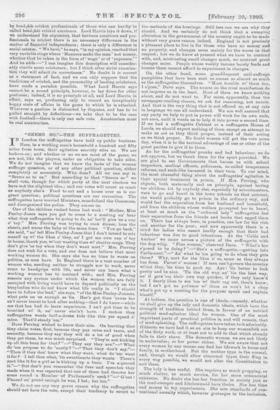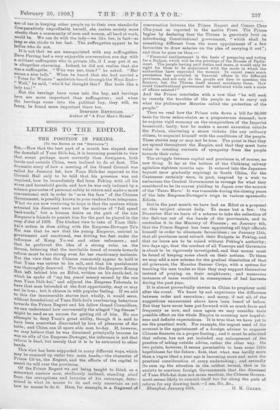"SEEMS SO."—THE SUFFRAGETTES.
TN London the suffragettes have held up public business. Here, in a working man's household a hundred and fifty miles from town, their agitation scarcely stirs us. We are lookers-on ; and whether or no we see most of the game, we are not, like the players, under an obligation to take aides. We do not imagine that we know the facts of the woman suffrage question, or of any other political question, either completely or accurately. Who does P All we can say is. "Seems so to us." But according to that "Seems so" we obeli vote, though for which party at the next election we have not the slightest idea ; and our votes will count as much as anybody else's. Food to eat and a house over us is our great question; political questions are our recreation. The suffragettes have worried Ministers, scandalised the Commons, and disorganised the police. They amuse us.
One of the children rushed home last week : "Mother, Miss Penley-Jones says you got to come to a meeting an' bear what they suffragettes be going to do, an' her'll give 'ee a cup o' tay." Mrs. Perring was trying to cook dinner, hem the sheets, and nurse the baby at the same time. " You go back," she said, " an' tell Miss Penley-Jones that I don't intend to mix meself up wi' the likes o' they, an' I got me own cup o' tay in house, thank you, wi'out wasting time wi' chatter-mega. They don't give 'ee tay when they don't want nort." Mrs. Perring does not wish for a vote, and she does not believe that most working women do. She says she has no time to waste on politics, as men have. In England there is a vast number of women who, needing neither to struggle nor to work, never come to bandgrips with life, and never can learn what a working woman has to contend with; and Mrs. Perring resents any system under which the women who are fully occupied with living would have to depend politically on the busybodies who do not know what life really is. "I should have to follow the lead," she says, " of the Miss Penley-Jonoses, what puts on us enough as 'tie. ' Her's got time 'cause her an't never learnt to'look after nothing—that I do know—while me that has had to learn experience, I an't got time to be troubled wi' it, an' never eha'n't have. I reckon they suffragettes wants half-a-dozen kids like this yer squad o' thine. That'd steady 'em."
Dave Perring wished to know their aim. On learning that
they claim votes, first, because they pay rates and taxes, and secondly, because they say • they will do a lot of good when they get them, he was much surprised. " They'm not kicking up all thic buzz for that ? "--" They say they are."—" What do 'em propose to do 'xactly ?"—" That they don't say."— " Then if they don' know what they want, what do 'em want it for P I tell thee what; 'tie sweethearts they wants. There's fort like it for a girl as is kicking up a buzz. I've a-proved it."—" But don't you 'remember the 'fuss and speeches they made when it was reported that one of them had throWn her arms round a Member of Parliament's neck ?"—" G'out ! Pleased an' proud enough he was, I bet; her too."
We do not see any very grave reason why the suffragettes should not have the vote, except their tendency to revert to the methods of the hustings. Still less can we see why they should. And we certainly do not think that a sweeping alteration in the government of the country ought to be made
without very grave reason indeed. England is not precisely a pleasant place to live in for those who have no money anti
no property, and changes seem mainly for the worse in that respect; but we do know at present what we have to contend with, and, mistrusting small changes much, we mistrust great changes more. People whose weekly income barely feeds and houses them cannot afford to experiment in changes.
On the other hand, some grandiloquent anti-suffrage pamphlets that have been sent us amuse us almost as much as the suffragettes themselves. "More trouble wi' them too, I s'pose," Dave says. The names on the rival manifestoes do not impress us in the least. Most of them we know nothing about, and do not want to. Far more, apparently, than the newspaper-reading classes, we ask for reasoning, not names. And that is the very thing that is not offered us, at any rate in language we can all understand. We are well assured that any party we help to put in power will work for its own ends, not ours, until it wants us to help it into power a second time. If we had a suffragette Cabinet or a suffragette House of Lords, we should expect nothing of them except an attempt to make us act as they think proper, instead of their acting as we think proper. No doubt women will get the vote some day, when it is to the tactical advantage of one or other of the great parties to give it to them.
As for the suffragettes' pranks and bad behaviour, we do not approve, but we thank them for the sport provided. We are glad to see Governments that harass us with school inspectors, medical officers, policemen, so-called temperance reforms, and such-like harassed in their turn. To our mind, the most shameful thing about the suffragettes' agitation is their special treatment in prison. if Mrs. Perring, who objects, both maternally and on principle, against having her children hit by anybody else, especially by schoolmasters, were to go and brawl in the town schools on that account, she would probably go to prison in the ordinary way, and would feel the separation from her husband and household, and from the children whose welfare prompted her to brawl, at least as much as the " cultured lady " suffragettes feel their separation from the friends and books that egged them on. There has always been, in practice, one law for the rich and another for the poor; and now apparently there is a third for ladies who assert loudly enough that their bad behaviour was due to good intentions. At the ' Cable and Anchor' we came across a picture of the suffragette with the dog-whip. " Fine woman," observed Dave. " What's her s'posed to be doing ?"—"She's a suffragette,—getting into Parliament."—" An' what be 'em going to do when they gets there? Why, nort for the likes o' us, same as they always has done. Parcel o' women ! If men can't govern the country wi'out they, 'tis time to pack up. Aye ! 'tis better to look pretty and be nice. 'Tie the old way, an' tis the beet way, au' it gets 'em their own way quicker, if they only know'd it. I dearly likes to see 'em wi their rag out, thee's know; but I an't got no patience wi' them as won't let a chap what's got up a meeting for the purpose speak and explain hisself."
At bottom, the question is one of ideals,—namely, whether we shall give up the lady and domestic ideals, which have the strength of tradition behind them, in favour of an untried political mud-splasher ideal for women. One of the most important parts of practical politics is, and will remain, that of mud-splashing. The suffragettes have taken to it admirably.
Hitherto we have had it as an aim to keep our womenfolk out of the dirty work, or at least not to add to that which already falls to their share. The domestic woman we are not likely to undervalue ; or her power either. We are aware that not every woman by any means can find her lifework in hOuse and family, in motherhood. But the mother type is the normal, and, though we would allow abnormal types their fling in every way possible, we would not alter the Constitution to suit them.
The lady is less useful. She requires so much propping, so much shelter, so much service, for her more ornamental existence. No doubt she has her function in society just as the road-sweeper and kitchenmaid have theirs. She has time and money to try experiments. She sets standards of con- ventional amenity which, however grotesque in the imitation, are of use in keeping other people up to their own standards• Comparatively unprofitable herself, she makes society more elastic than a community of men and women, all hard at work, could be. We can do with the lady—we like her, in fact—so long as eke sticks to her last. The suffragettes appear to be ladies who do not.
It is not that we are unacquainted with any suffragettes. Dave Perring had a very enjoyable conversation one day with a militant suffragette who in private life, if I may put it so, Is altogether charming. Indeed, lie did not realise that she MRS a suffragette. "Who was her, then P " he asked. " Her seems a nice lady." When be heard that she had carried a "Votes for Women" sandwich-hoard through the West End- " Well," he said, " who'd ha' thought this P Her looks like a lady too!"
But the herrings have come into the bay, and herrings here are more important than suffragettes ; and when the herrings come into the political bay, they will, we fancy, be fouud more important there too.
STEPHEN REYNOLDS,
Author of " A. Poor Man's House."











































 Previous page
Previous page